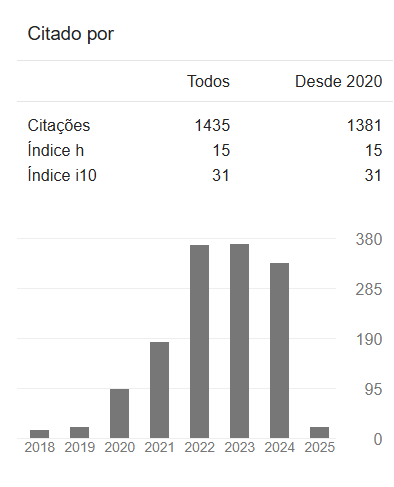THE GAME AS A PEDAGOGICAL RESOURCE IN SCIENCE EDUCATION: A PROPOSAL FOR THE TEACHING AND LEARNING OF BIODIVERSITY
DOI:
10.23926/RPD.2021.v6.n2.e036.id1047Keywords:
Didactic Game, Teaching and learning, Science teaching, BiodiversityAbstract
Playfulness in the school environment favors the development of investigative and creative actions in the teaching and learning process. This article presents the didactic game of pedagogical strategy for the teaching of Sciences. The board game called: “Guardians of Biodiversity”, aimed at the Atlantic Forest biome, was made with low-cost and easily accessible resources. The target group was the class of the 7th year of the final years of elementary school, carrying out the study in an urban and regular public school in the Zona da Mata Mineira (MG), in 2019. It is, therefore, a qualitative research and the information obtained was organized based on descriptive analysis. It is evidenced that the didactic game constitutes a viable alternative for the construction of knowledge in Science teaching in an interdisciplinary way, by stimulating the cooperative and socialization relations between educator-learner and learner-learners.
Downloads
Metrics
References
ALMEIDA, Paulo Nunes de. Educação Lúdica: Prazer de Estudar - Técnicas e jogos pedagógicos. São Paulo: Edições Loyola, 1998.
ARANTES, Valéria Amorim; MACEDO, Lino de; MACHADO, Nílson José. Jogo e projeto: Pontos e contrapontos. São Paulo: Summus, 2006.
ARIÈS, Philippe. História Social da Criança e da Família. Rio de Janeiro: Zahar, 1981.
BRASIL. Base Nacional Comum Curricular. Brasília: MEC, 2017. Disponível em: http://basenacionalcomum.mec.gov.br Acesso em: 26 de mar. de 2020.
BROUGÈRE, Gilles. Jogo e educação. Porto Alegre: Editora Artes Médicas, 2003.
CACHAPUZ, Antônio; GIL-PÉREZ, Daniel; CARVALHO, Anna Maria Pessoa de; PRAIA, João; VILCHES, Amparo. A necessária renovação do ensino das Ciências. São Paulo: Cortez, 2011.
CALEFI, Paulo Sérgio; ESCREMIN, João Vicente. Jogos, Ensino e Formação de Professores Reflexivos. Curitiba: Appris, 2018.
CARVALHO, Anna Maria Pessoa de; GIL-PÉREZ, Daniel. Formação de professores de Ciências: tendências e inovações. São Paulo: Cortez, 2011.
CHASSOT, Attico Inácio. Educação Consciência. Santa Cruz do Sul: EDUNISC, 2010.
CRISOSTIMO, Ana Lúcia; KIEL, Cristiane Aparecida. O Lúdico e o ensino de Ciências: saberes do cotidiano. Guarapuava: Ed. da Unicentro, 2017.
CUNHA, Márcia Borin. Jogos no Ensino da Química: Considerações Teóricas para sua utilização em sala de aula. Revista Química Nova na Escola, v. 34, n, 2, 2012. Disponível em: http://qnesc.sbq.org.br/online/qnesc34_2/07-PE-53-11.pdf Acesso em: 09/03/2021.
HUIZINGA, Johan. Homo ludens: O jogo como elemento da cultura. São Paulo: Perspectiva, 1990.
LIMA, José Milton. O jogo como recurso pedagógico no contexto educacional. São Paulo: Cultura Acadêmica Editora, 2008.
MESSEDER NETO, Hélio Silva; MORANDILLO, Edilson. Fortuna. O Lúdico no Ensino de Química: Considerações a partir da Psicologia Histórico-Cultural. Revista Química Nova na Escola, v. 38, n. 4, 2016. Disponível em: http://qnesc.sbq.org.br/online/qnesc38_4/11-EQF-33-15.pdf. Acesso em: 09/03/2021.
OLIVEIRA, Maria Marly de. Como fazer pesquisa qualitativa. Petrópolis, RJ: Vozes, 2007.
REIS, Edna Afonso; REIS, Ilka Afonso. Análise descritiva de dados. Relatório Técnico do Departamento de Estatística da UFMG. Disponível em: http://www.est.ufmg.br/portal/arquivos/rts/rte0202.pdf Acesso em: 09/03/2021.
SANTOS, Wildson Luiz. Pereira. Educação científica na perspectiva do letramento como prática social: funções, princípios e desafios. Revista Brasileira de Educação, v. 12, n. 36, 2007. Disponível em: https://www.scielo.br/pdf/rbedu/v12n36/a07v1236.pdf Acesso em: 09/03/2021. DOI: https://doi.org/10.1590/S1413-24782007000300007
SILVA, Aline Aparecida Teixeira; CATÃO, Vinicius; SILVA, Aparecida Fátima Andrade. Análise de uma sequência didática investigativa sobre estequiometria abordando a Química dos sabões e detergentes. Revista Prática Docente, v.5, n.2, 2020. Disponível em: http://periodicos.cfs.ifmt.edu.br/periodicos/index.php/rpd/article/view/736 Acesso em: 09/03/2021. DOI: https://doi.org/10.23926/RPD.2526-2149.2020.v5.n2.p1256-1277.id736
SILVA, Andreia Santos. Circuito do Sistema Nervoso: aplicação de jogos como estratégia de aprendizagem no ensino de Biologia. Cadernos da Educação Básica, v. 1, n. 2, 2016. Disponível em: http://www.cp2.g12.br/ojs/index.php/cadernos/article/view/795 Acesso em: 09/03/2021. DOI: https://doi.org/10.33025/ceb.v1i2.795
SOARES, Márlon Herbert Flora Barbosa. Jogos e Atividades Lúdicas para o Ensino de Química. Goiânia: Kelps, 2013.
SOUSTELLE, Jacques. A civilização asteca. Rio de Janeiro: Jorge Zahar Ed., 2002.
XAVIER, Patrícia Maria Azevedo; FLÔR, Cristhiane Carneiro Cunha. Saberes populares e educação científica: um olhar a partir da literatura na área de ensino de ciências. Ensaio: Pesquisa em Educação em Ciências, v. 17, n. 2, 2015. Disponível em: https://www.scielo.br/scielo.php?pid=S198321172015000200308&script=sci_abstract&tlng=pt Acesso em: 09/03/2021. DOI: https://doi.org/10.1590/1983-21172015170202
Downloads
Published
How to Cite
Issue
Section
License
Copyright (c) 2023 A Revista Prática Docente tem o direito de primeira publicação

This work is licensed under a Creative Commons Attribution-NonCommercial 4.0 International License.
Authors who publish in this journal agree to the following terms:
- Authors retain the copyright and grant the journal the right of first publication, with the paper simultaneously licensed under the Licença Creative Commons Attribution allows the sharing of the work with acknowledgment of authorship and initial publication in this journal.
- Authors are authorized to take additional contracts separately, for non-exclusive distribution of the version of the work published in this journal (e.g. publish in institutional repository or as a book chapter), with acknowledgment of authorship and initial publication in this journal.











